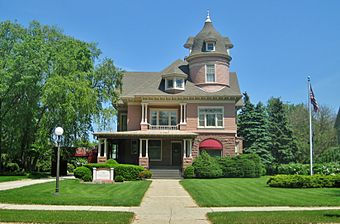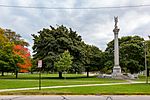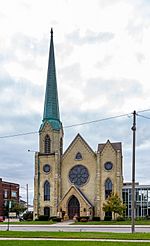Library Park Historic District (Kenosha, Wisconsin) facts for kids
Quick facts for kids |
|
|
Library Park Historic District
|
|

The Urban J. Lewis House (1892)
|
|
| Location | Roughly bounded by 59th St., 7th Ave., 61st St., and 8th Ave., Kenosha, Wisconsin |
|---|---|
| Area | 17 acres (6.9 ha) |
| Architect | Daniel Burnham, Charles H. Walcott |
| Architectural style | Italianate, Gothic Revival, Classical Revival |
| NRHP reference No. | 88002657 |
| Added to NRHP | November 29, 1988 |
The Library Park Historic District is a special neighborhood in Kenosha, Wisconsin. It's built around Library Park. This park was first planned like a town square in New England. The district has 42 important buildings. They were built between 1843 and 1930. The whole area was added to the National Register of Historic Places in 1988. This means it's recognized for its important history.
Contents
History of Library Park
Kenosha, Wisconsin, was first settled in 1835. Two early settlers, Charles Durkee and George Kimball, owned land next to each other. They decided to give some of their land to Kenosha. This land became a city park.
The park attracted more settlers. By the mid-1840s, Volney French and Lucien Scribner built their homes there. These homes looked out over the park. By 1861, most of the land around the park was taken. Many of these early houses were later replaced. But the French and Scribner houses are still standing today.
The Underground Railroad Connection
During the Civil War, the neighborhood became a safe place. It was part of the Underground Railroad. This was a secret network that helped people escape slavery. Ruben H. Deming helped run this effort.
His house at 1116-18 61st Street was a stop. The Hale–Farr house also helped. People seeking freedom would stay in these homes. They would wait there until they could get on ships at the Kenosha harbor. These ships would take them to safety.
Buildings and Architecture
Two important church buildings were built in the 1870s. The First Congregational Church was built in 1874. St. Matthew's Episcopal Church followed in 1879.
The Queen Anne style was popular in the 1890s. You can see examples in the Nathan R. Allen, Jr. House and the Urban J. Lewis House. The Gilbert M. Simmons Memorial Library opened in 1900. It was designed by famous architect Daniel Burnham. This library was built in the middle of City Park. After it was built, the park became known as Library Park.
Growth and Famous Residents
Kenosha grew steadily in the 1900s. This meant new buildings had to be built on smaller pieces of land. Examples include the Charles Stuart House (1907) and the Craftsman C. Ernest Dewey House (1910).
A very famous person was born here. Orson Welles, a well-known director and actor, was born in an 1880 house. His birthplace was at 6116 Seventh Avenue on May 6, 1915.
The beautiful Neoclassical design of the library inspired other buildings. The Masonic Temple (1924) and the YMCA building (1930) copied its style. The district didn't see much new building after World War II. On November 29, 1988, the area was officially added to the National Register of Historic Places. This was done by the National Park Service.
 | Jackie Robinson |
 | Jack Johnson |
 | Althea Gibson |
 | Arthur Ashe |
 | Muhammad Ali |





